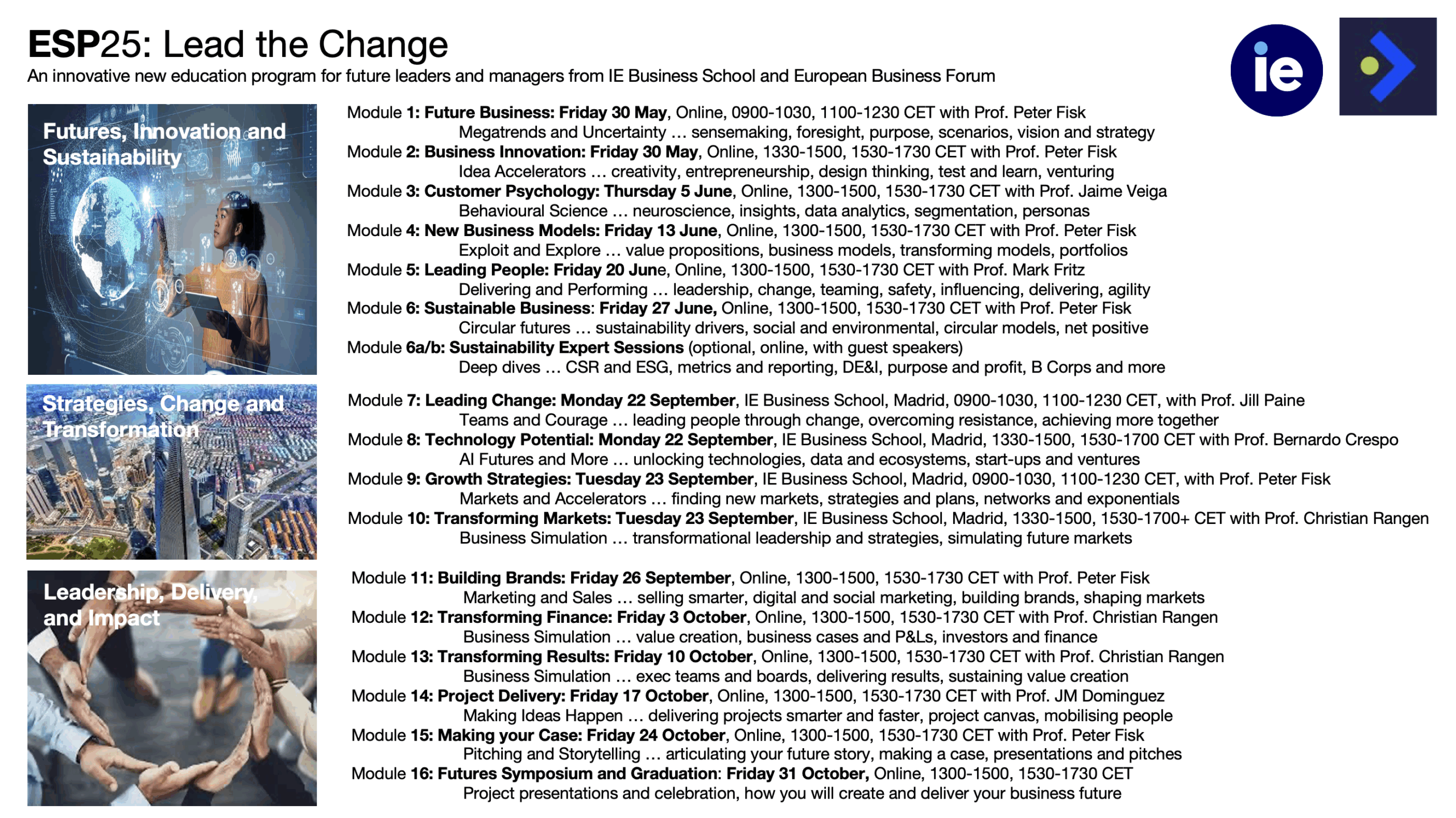Lead the Change: Future Symposium
October 31, 2025 at ESP25

Incredible technologies and geopolitical shifts, complex markets and stagnating growth, demanding customers and disruptive entrepreneurs, environmental crisis and social distrust, unexpected shocks and uncertain futures.
For every business leader, the challenge is about making sense of today’s rapidly changing world, and understanding how to prepare for, and succeed, in tomorrow’s world.
We explore how businesses can survive and thrive, and move forwards to create a better future. How to reimagine business, to reinvent markets, to reengage people. We consider what it means to combine profit with more purpose, intelligent technologies with creative people, radical innovation with sustainable impact.
We learn from the innovative strategies of incredible companies – Alibaba and ASML, Biontech and BlackRock, Canva and Collossal, NotCo and Netflix, Patagonia and PingAn, Spotify and Supercell, and many more. We also take a look at what this means for insurance, and some of the most innovative companies in the field.

Are you ready to seize the opportunities of a changing world?
How will you – and your strategy, organisation, people and projects – embrace the challenges and opportunities of change ahead of us? Where are your biggest opportunities for innovation and growth? What are your priorities to balance short and longer term? How will you behave as a manager and leader?
We’ve developed a new program for business leaders, managers of companies large and small, to get up to speed with the very latest ideas, tools and approaches to business, learning from companies and experts around the world. It’s called the Executive Management Program, delivered as a hybrid program online and in face to face in Madrid.
It’s like a Mini MBA, but fit for today’s world, where challenges like economic uncertainty and climate change are matched by opportunities like the applications of AI and new business models. It includes an exciting dynamic business simulation, about managing and leading change, plus insights and ideas from the world’s most interesting companies, right now.
In fact it brings together much of the Global Online MBA from IE Business School, which is ranked #1 in the world, and in particularly for topics such as ESG and sustainability. The faculty is made up of expert professors from IE and beyond, and we spend a number of days in Madrid at IE’s Executive Education campus.
For more info, contact me directly: peterfisk@peterfisk.com

Module 16: Futures Symposium, The Future of Danish Business
Denmark has long been admired for its blend of economic dynamism, social trust, and environmental leadership. It boasts a globally competitive business environment, world-class infrastructure, a highly skilled workforce, and a culture of innovation. But like every nation, Danish business now faces a future shaped by disruption: climate imperatives, digital transformation, demographic shifts, geopolitical uncertainty, and new global economic models.
The future of Danish business will depend not just on adapting to change but on leading it. Reinvention—not incremental improvement—will define the next era. This transformation is already underway across Denmark’s industries, startups, and corporate boardrooms.
Sustainability as a Danish Strategy
Denmark has long been a global pioneer in green energy and sustainable practices. With companies like Ørsted, Vestas, and Rockwool setting the global standard for climate innovation, sustainability has moved from the periphery of business to its core.
Ørsted’s transformation from a fossil-fuel-heavy utility to the world’s leading offshore wind developer is now a business school case study in reinvention. The company shed its oil and gas assets and bet its future on renewables—gaining global market leadership and multiplying its market value in the process.
This kind of transformation is not just ethical; it’s economic. Investors increasingly favor ESG-aligned companies, global supply chains demand low-carbon operations, and customers expect brands to act on climate.
The future of Danish business lies in leveraging sustainability as a competitive advantage—not just meeting targets, but creating new value through circular models, clean tech, regenerative agriculture, and climate adaptation solutions.
Digital Denmark: From Technology Adoption to Technology Creation
Denmark ranks high on digital adoption, with strong infrastructure, digital public services, and a tech-savvy population. But the next leap forward will require moving from technology adopters to technology creators.
While Copenhagen’s startup scene has gained momentum—with unicorns like Zendesk, Unity, and Pleo—there is still untapped potential to scale Danish innovation globally.
The future lies in deeper investments in AI, quantum computing, biotech, and green digital solutions. Initiatives like Digital Hub Denmark, partnerships between academia and business, and EU-aligned research missions will help accelerate this shift.
Established players like Maersk are also evolving into digital-first businesses. Maersk is building digital platforms to optimize supply chains, track carbon footprints, and reduce shipping inefficiencies—turning a legacy logistics giant into a digital ecosystem.
Biotech, Life Sciences, and Health Innovation
Denmark’s life sciences sector is a powerhouse—accounting for over 20% of exports. Novo Nordisk, Lundbeck, and Leo Pharma are global leaders in diabetes, CNS, and dermatology.
Looking ahead, the convergence of biotech, AI, and personalized medicine will reshape health innovation. Novo Nordisk’s success in GLP-1 treatments is just the beginning. Future value will be created through precision health, genomic technologies, AI-driven diagnostics, and preventive care platforms.
Denmark’s world-class research institutions, data infrastructure, and public-private trust position it well to lead in this space—especially if it can integrate patient-centric innovation with strong ethical governance.
SMEs and the Next Generation of Value Creation
Denmark’s economy is powered not just by large companies, but by thousands of small and medium-sized enterprises (SMEs). These businesses are now facing intense pressure to digitalize, decarbonize, and innovate in order to survive and grow.
The future of Danish SMEs lies in their ability to:
-
Embrace digital tools and data to boost productivity
-
Innovate through collaboration, including ecosystems and open innovation
-
Integrate sustainability into their value proposition
-
Attract and retain next-generation talent through purpose and flexibility
Platforms like the Danish Export Association, Innovation Fund Denmark, and GreenLab Skive offer critical support. But future success will depend on shifting mindsets from risk-averse incrementalism to bold reinvention.
Green Manufacturing and Advanced Materials
Traditional manufacturing in Denmark must also evolve—toward smarter, greener, and more globally connected models. Denmark’s industrial base, known for quality and craftsmanship, is increasingly embracing Industry 4.0: automation, robotics, digital twins, and data-driven supply chains.
Companies like Grundfos and Danfoss are leading this transition, combining energy efficiency with advanced engineering to serve global infrastructure needs. Others are exploring additive manufacturing, smart materials, and circular design.
Denmark has the chance to become a hub for clean industrial innovation—producing the technologies that others will need to decarbonize their own economies.
Financial Innovation and the Rise of Fintech
Danish banks and insurers face growing disruption from digital-native financial services. At the same time, fintechs are gaining scale and legitimacy, with Copenhagen-based Lunar, June, and Pleo leading a new wave of user-friendly, mobile-first platforms.
The future of Danish financial services will be defined by:
-
Embedded finance in platforms and commerce
-
Sustainable finance and ESG-aligned capital allocation
-
Blockchain and tokenization for trust and transparency
-
AI and automation to personalize and optimize services
Collaboration between regulators, incumbents, and startups—backed by strong consumer data protection—will be essential to shape this next chapter.
Culture, Collaboration, and Global Mindset
One of Denmark’s greatest assets is its culture of trust, equality, and collaboration. This enables agile decision-making, flat hierarchies, and a strong sense of purpose in work—qualities that are essential for innovation.
The challenge ahead is to combine this cultural strength with global ambition. Danish companies must build beyond the Nordics, expand to new growth markets, and act with the scale of global challengers. That means embracing diversity, building international teams, and navigating global complexity with speed.
What the Future Demands: Reinvention as a Way of Life
In a world that changes faster than any strategy, Danish business leaders must move from planning to piloting, from certainty to adaptability, and from optimizing today’s business model to inventing tomorrow’s.
The future will not be shaped by those who maintain efficiency—but by those who create new forms of value. That means:
-
Moving from products to platforms
-
From ownership to access models
-
From supply chains to value ecosystems
-
From profit-centric models to impact-driven business
The next wave of iconic Danish companies will be those that understand how to scale technology, solve systemic problems, and embed purpose into the core of value creation.
Denmark as a Model for Sustainable, Innovative Capitalism
The future of Danish business is not just about economic resilience. It’s about setting a global example for what modern capitalism can look like—one where sustainability, innovation, equity, and purpose converge.
If Denmark can build on its existing strengths, embrace technology and reinvention, and scale its impact globally, it can become not just a leader in business—but a blueprint for the next era of business itself.
Find out more and book >